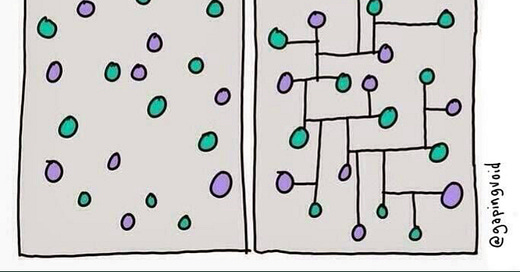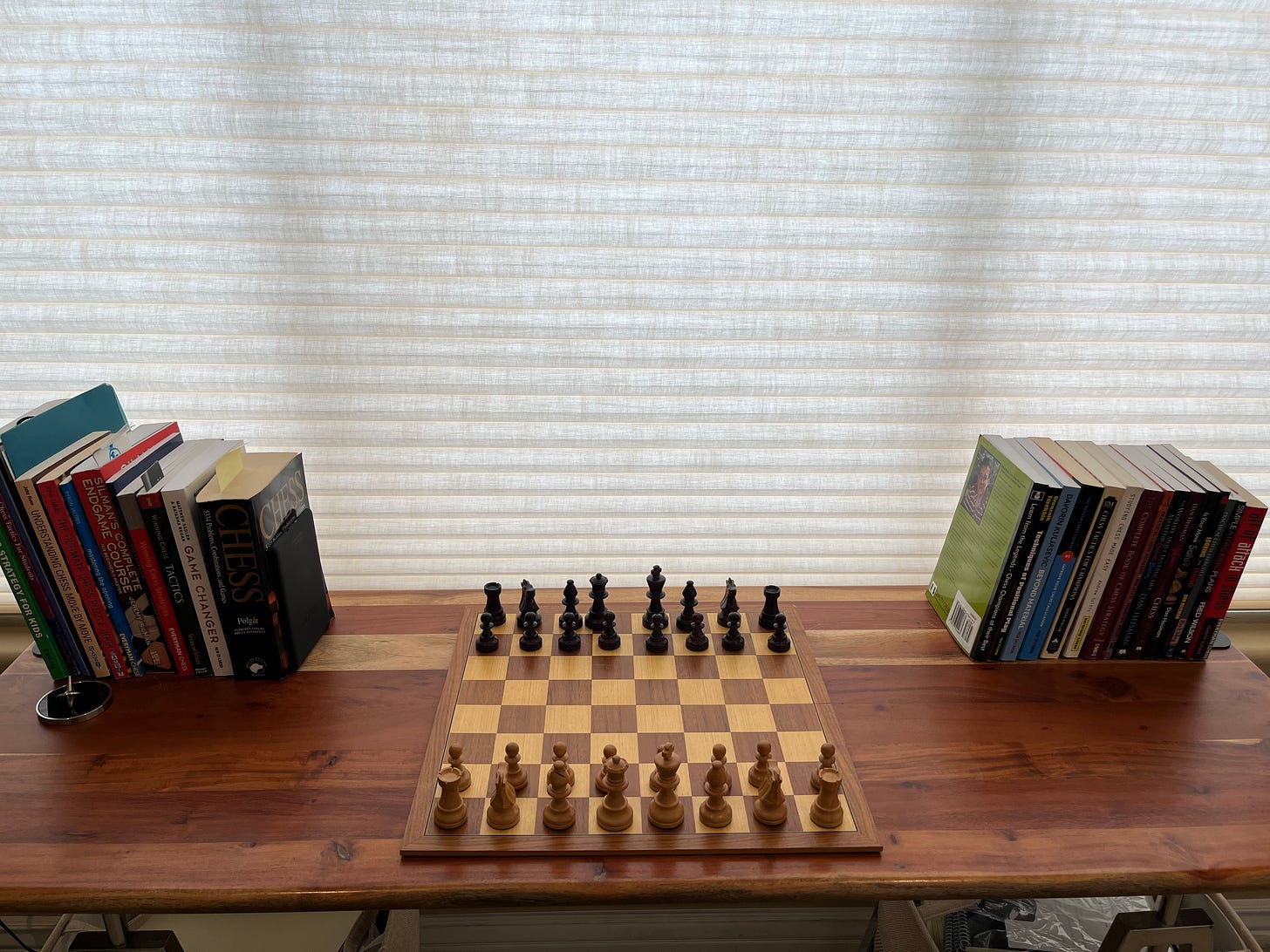I own a lot of chess books. It’s not a brag, as I’ve not read most of them. The ones I have I’ve enjoyed and learned a lot from. Apparently I’m not alone. There’s a tremendous appetite for chess books. Each time I get one it’s either thanks to Ben Johnson or someone else influential telling me how good the book was. Other times my coach mentions a book in one of our lessons and I’ll run out and get it 10 minutes after our lesson is over. They look nice on the table next to my chess set, don’t you think?
I’m used to studying since I spent so many years doing that to become a doctor. However there’s a fundamental problem. Chess books (and videos, Chessable courses, and all the other forms of chess “edutainment”) offer knowledge only. Skill on the other hand is earned through practice. Even Capablanca noted this issue.
“Chess books should be used as we use glasses: to assist the sight, although some players make use of them as if they thought they conferred sight.”
The most I ever knew about medicine was after my second year in medical school I had spent two years studying every day. I had passed my Step 1 test, certifying that I knew all the fundamental information and theory required to progress. Two years of anatomy, immune defense, genetics, hematology, pathophysiology, etc… I stood at the top of a mountain of knowledge. That was the time I was also the most dangerous… because I had no clinical skill. I didn’t know what I didn’t know. I needed to learn how my knowledge connected with actual patients.
For the next 6 years (2 years of medical school and 4 years of residency) I started to fill in those gaps. I stopped studying general topics that were broadly applicable, and had to start focusing in on much narrower topics. Things like Psychology, General Surgery, Obstetrics, Emergency Medicine, Cardiology, etc… I had to learn how to get along in the hospital. How to speak in “medical-ese” to other medical professionals. How to speak to patients, and assess their medical condition. In short I had to practice and learn the skill of being a doctor. That took me much longer than acquiring the knowledge. If the statistics are to be believed then I didn’t become a “mature” physician until 5 years AFTER I completed my residency. There’s just so much to see and learn. I hope you can see how this can apply to chess.
In medicine we say that “The eye cannot see what the mind does not hold.” This is how we know inexperienced clinicians are dangerous. They just miss stuff. The same holds true in chess. Take this game for example:
It’s a 10 minute game and I’ve used 37 seconds. I played the next move (Ncxe5??) in 12 seconds, missing the attack on h7. I can say I didn’t see it… but maybe I hadn’t practiced the skills either.
What skill you ask? I believe there are at least three fundamental skills in chess: Visualization, Calculation, and Evaluation. However I might add simple things like “Using your time well” or “looking for threats” as well.
Let’s talk about looking for threats. This skill will make you a better player. Ask yourself “what can my opponent do in this position”? It’s is a simple step but not one that is emphasized enough. All the tactics puzzles seem to be “White to play and win” and focused on “What can I do?” All the videos are focused on sacrifices and strong play. To really improve, I needed to better identify how I could lose in each position. Only then could I respond, or even begin to calculate the right moves. Here’s another game from my “pre-Chess Steps” era:
Again it’s a 10 minute game (note how little time we’ve used) and I’ve taken the pawn on e5. My opponent takes 3 seconds and plays Qxe5?? allowing me to mate with Qxg2#.
It’s a simple step… “how can I lose” or “what can my opponent do” is essentially the famed blunder check. We have to do this all the time in emergency medicine. I call myself a “professional pessimist” having to think about what might kill my patient. Almost all of the malpractice cases stem from not having fully thought this through.
In chess I find many players (myself included) don’t practice this skill with intention. We will all be stuck until we hone the skill of looking for threats before each and every move. No amount of book knowledge will help here. If you can learn to consistently identify your opponent’s threats, you’ll see great improvement.
Now let’s talk about using our time well. NM Dan Heisman has said that whatever time game we play, be prepared to use almost all of our time. But use it on what? Invariably we will reach a critical position where we’ll need to take time and think. What’s a critical position?
To repeat, a critical position is one where there’s either an exchange, a change in pawn structure, or a series of forced moves. Can you think how many times you had one of those in your last game?
I’ve said before that essentially chess is a game of timed decision making. This is what we need to spend our time on, thinking through critical positions. Before we capture a piece, change the pawn structure, or enter into a tactic we really need to think it through. Spend no more than 20% of our time on the opening so we have time left for the critical positions.
In all the books I’ve read I don’t remember anyone ever discussing this in depth. I had to learn by playing how I should use my time and on what. I propose to you that our time as chess players is best spent looking for our opponents’ threats and thinking through critical positions. These two “skill” are what we need to practice with intention to really improve. Don’t take it just from me.

Just like in medicine, book knowledge is necessary but not sufficient for excellence. Actual gameplay will show you the “holes” in your game. This is why residency is so important for doctors, you are shown what you don’t known one patient at a time. Chess doesn’t have a residency per se, but think of every game as a chance to practice. Games aren’t tests of our knowledge, they’re tests of our skill. As chess players, our goal doesn’t need to be “read all the books”. Instead our goal needs to be “develop skills”.
Thanks for reading. If you like it, please tell a friend about this Substack.
Nick Vasquez
Up next - How to learn from each game









Very interesting; the study of law is similar, first a lot of knowledge and then the skill to apply the knowledge to cases and disputes.
Really appreciate this perspective - strong reminder of the critical aspect of persistence and determination required at any level.